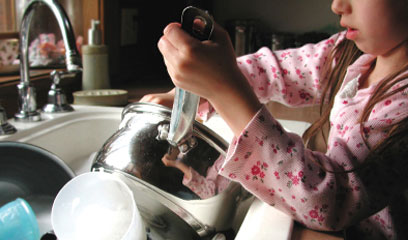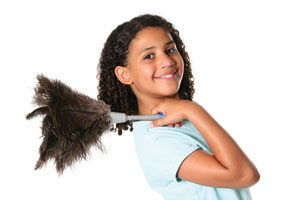 Getting kids to help around the house can be a real chore for parents. We know it’s important, but how do we motivate our elementary-age kids, who have so many “better” things to do? Some parents say the answer is to pay our young apprentices. But many experts advise against this.
Getting kids to help around the house can be a real chore for parents. We know it’s important, but how do we motivate our elementary-age kids, who have so many “better” things to do? Some parents say the answer is to pay our young apprentices. But many experts advise against this.
Stephanie Cross, a parent educator and counselor in King and Snohomish counties, teaches a parenting series called Sanity Circus. Cross discourages parents from paying kids for completing household tasks. “We get our sense of belonging and significance by contributing,” she says. “Children make meaningful contributions by taking part in family work. Reward discourages intrinsic motivation.”
An allowance is OK, Cross says, if it’s not linked to chores, and it’s OK to give kids the chance to earn extra money by doing extra jobs, not routine household duties.
A good attitude
Kids are quick to pick up on underlying feelings, Cross says, so parents should try to model a healthy attitude about work. This applies especially to how we approach household chores, particularly when children are watching — or, better yet, helping. “Enlist cooperation from your child,” Cross says. “Start early, and don’t remind or nag.” Cross suggests working alongside children and inviting them to help. Consider it a long-term process that slowly builds a healthy work ethic, she cautions, not a quick fix for busy parents who simply want a job like loading the dishwasher or emptying the garbage done.
When elementary-age kids fall short of the mark, Cross suggests parents get creative. “Parents will have to look for solutions and go back to the drawing board again and again,” she says. Solving problems at family meetings, choosing tasks from a job jar and rotating them regularly, and reminding kids firmly, “My job is X, your job is Y,” all contribute to how children integrate a healthy work ethic, Cross says.
Not just ‘busy work’
“Kids need to feel that they are needed and really contributing to the group. It isn’t just busy work,” Cross says. “The primary goal of all human beings is to belong, and we achieve this through contributing.” When kids learn this lesson without the carrot-and-stick of financial reward, their understanding of their own work’s value in the largest sense will be deeper and more holistic, according to Cross.
 Julie Moss Scandora, a Seattle mother of three grown children and author of One in a Million: Bringing Out What Is Wondrous in Your Child Through Trust, Understanding, and Respect, says parents should give kids a little leeway to perform tasks their own way. She never paid her kids for chores.
Julie Moss Scandora, a Seattle mother of three grown children and author of One in a Million: Bringing Out What Is Wondrous in Your Child Through Trust, Understanding, and Respect, says parents should give kids a little leeway to perform tasks their own way. She never paid her kids for chores.
“Children like to imitate and help with tasks,” she explains. “My kids were happy to work. Because they identified with what they did, they were excellent workers. I felt they needed to learn how to do things, and I was respectful in how and when I asked for their help.
“Work is not some odious thing — it’s just a part of life,” Scandora says. “There were many things I just expected my kids to do, like bringing in groceries and making beds. I didn’t see them as chores,” she says.
Scandora admits that it was sometimes frustrating to let kids do things their own way. “Sometimes I would just remove myself physically and let them go at it. And if having something done exactly right really mattered, I didn’t ask for their help on that thing.”
Starting as young as age 6 or 7, Scandora’s kids earned money from neighbors by doing yard work, and eventually baby-sitting. Scandora feels this taught them the value of money. “Money is meaningless to kids who get too high of an allowance,” she says.
Helping kids develop a healthy work ethic gives parents the chance to examine their own feelings about why they work, beyond the paycheck. And if our children learn to embrace work as a means of personal satisfaction, not just a path to financial reward, they may eventually join the lucky number of adults who like, or even love, what they do.
Paula Becker is a Seattle freelance writer and mother of three.









